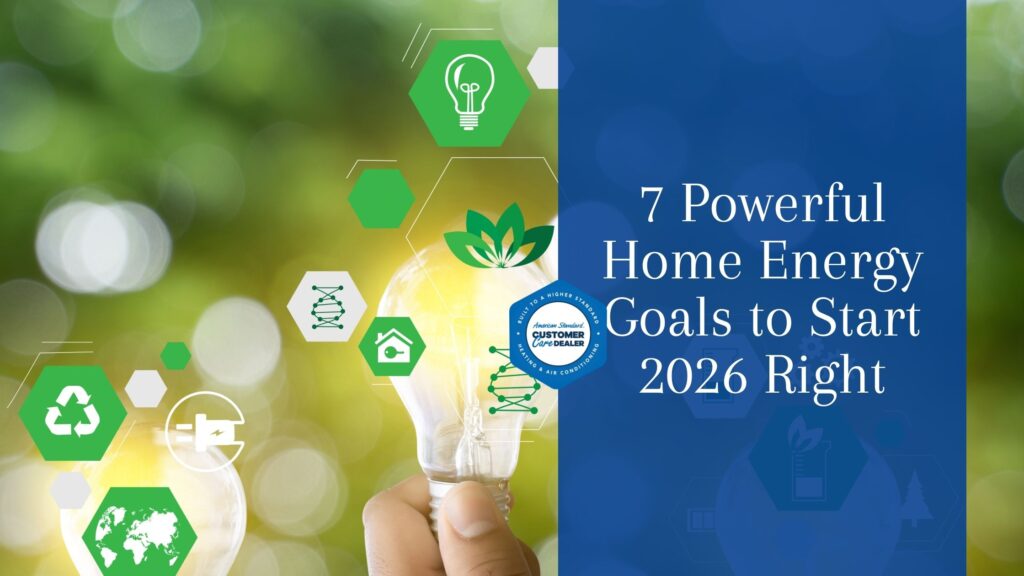7 Powerful Home Energy Goals to Start 2026 Right
The start of a new year is the perfect time to set goals—not just for personal growth but also for your home. Energy efficiency is one of the most impactful ways to reduce utility bills, protect the environment, and enhance comfort in your living space. For homeowners in Auburn, AL, where humidity and fluctuating temperatures can affect your comfort, implementing the right energy goals in 2026 can make a big difference.
In this guide, we’ll explore 7 powerful home energy goals to help you start 2026 right, from simple adjustments to smart investments that save money and improve comfort.
1. Optimize Your HVAC System for Maximum Efficiency
Your HVAC system is the heart of your home’s comfort and energy usage. If your system is outdated or poorly maintained, it can consume excessive energy and increase your monthly bills.
Energy goal: Schedule a professional HVAC tune-up early in the year. This includes checking refrigerant levels, cleaning coils, inspecting ducts, and ensuring your system runs efficiently.
Bonus tip: Consider upgrading to a high-efficiency HVAC system if your current unit is over 10 years old. Modern systems can reduce energy consumption by up to 20–30% while improving indoor air quality.
2. Seal Leaks and Improve Insulation
Air leaks and inadequate insulation are major contributors to energy waste. Even small gaps around windows, doors, and attics can let conditioned air escape, forcing your HVAC system to work harder.
Energy goal: Conduct a home energy audit to identify leaks and insulation gaps. Seal cracks with weatherstripping or caulk, and consider adding insulation to your attic or walls.
Impact: Proper sealing and insulation can reduce energy bills by 10–20% and keep your home more comfortable year-round.
3. Upgrade to Energy-Efficient Appliances
Older appliances often consume more energy than necessary. Replacing them with Energy Star-certified appliances is a smart investment that pays off over time.
Energy goal: Replace inefficient refrigerators, washers, dryers, and water heaters with high-efficiency models. Look for smart appliances that can be scheduled to operate during off-peak hours for additional savings.
Extra benefit: Energy-efficient appliances not only reduce your electricity bills but also decrease your carbon footprint.
4. Implement Smart Home Technology
Smart home devices can optimize energy usage without sacrificing comfort. Thermostats, lighting, and plugs that adjust automatically save both energy and money.
Energy goal: Install a programmable or smart thermostat that learns your schedule and preferences. Pair it with smart lighting and energy-monitoring outlets to reduce waste.
Pro tip: Many smart thermostats provide energy reports that show which rooms or appliances consume the most power, helping you make better decisions.
5. Focus on Water Heating Efficiency
Water heating can account for up to 18% of your home energy use. Simple adjustments and upgrades can significantly reduce this consumption.
Energy goal: Lower your water heater temperature to 120°F, install low-flow showerheads, and insulate your water heater and pipes. If your unit is older than 10 years, consider a high-efficiency tankless water heater.
Extra tip: Schedule showers and laundry during off-peak hours if your utility company offers time-of-use pricing to save more on energy costs.
6. Harness Renewable Energy
Investing in renewable energy sources like solar panels can drastically reduce reliance on grid electricity and lower long-term energy costs.
Energy goal: Explore solar panel installations or solar water heating options for your home. Even partial solar coverage can offset a significant portion of your energy usage.
Added advantage: Renewable energy incentives and tax credits are available in Alabama, making the initial investment more affordable.
7. Maintain a Year-Round Energy Routine
Consistency is key to energy efficiency. Small, regular actions throughout the year can compound into big savings.
Energy goal: Create a monthly energy checklist that includes:
- Cleaning or replacing HVAC filters
- Checking insulation and sealing leaks
- Monitoring energy bills for unusual spikes
- Adjusting thermostat schedules for seasonal changes
Tip: Involving the whole family in energy-saving habits—like turning off lights when not in use—can reinforce the routine and reduce waste.
Commonly Asked Questions About Home Energy Goals
Q1: How much can I realistically save by improving energy efficiency at home?
A1: The average homeowner can save 10–30% on energy bills by implementing efficiency measures, depending on the size of the home, current system efficiency, and the upgrades performed.
Q2: Do energy-efficient HVAC systems require special maintenance?
A2: While energy-efficient HVAC systems are designed to run efficiently, routine maintenance—such as cleaning filters, inspecting ducts, and checking refrigerant levels—is essential to maintain peak performance and longevity.
Q3: Is upgrading insulation really worth the cost?
A3: Yes. Proper insulation and sealing air leaks can reduce energy bills by up to 20% and prevent your HVAC system from overworking, which saves both money and energy in the long run.
Q4: Can I start small with these goals?
A4: Absolutely. Start with simple steps like lowering your water heater temperature, sealing air leaks, or using a programmable thermostat. Gradually add more advanced solutions like renewable energy or appliance upgrades.
Q5: Are there local programs or incentives in Auburn, AL, to support energy efficiency?
A5: Yes. Many utility companies offer rebates for energy-efficient appliances, solar panel installations, and HVAC upgrades. Check with local providers to see what programs are currently available.
Bonus Tips for Alabama Homeowners
Because Auburn, AL, experiences high humidity, maintaining indoor comfort efficiently requires special attention:
- Use ceiling fans to reduce reliance on air conditioning.
- Keep blinds or curtains closed during peak sun hours to reduce heat gain.
- Regularly clean air ducts to maintain airflow and reduce HVAC strain.
- Consider dehumidifiers to manage indoor moisture, which helps your system operate more efficiently.
By combining these tips with your 2026 energy goals, you can create a home that is both comfortable and cost-effective year-round.
Contact Us
If you have any questions or need assistance implementing Alabama humidity solutions in your home, don’t hesitate to contact Spencer Heating & Air. We are committed to providing the best HVAC services to our community. Reach out at our website or call us directly at 334-887-9020.
Let us help you maintain a comfortable and efficient home in Auburn, AL—even on the most humid days.


